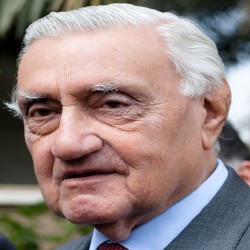
Adnan Pachachi
| Date of Birth | : | 14 May, 1923 |
| Date of Death | : | 17 Nov, 2019 |
| Place of Birth | : | Baghdad, Iraq |
| Profession | : | Politician |
| Nationality | : | Iraqi |
Adnan al-Pachachi or Adnan Muzahim Ameen al-Pachachi was a veteran Iraqi and Emirati politician and diplomat. Pachachi was Iraq's Permanent Representative to the United Nations from 1959 to 1965 and Minister of Foreign Affairs of Iraq from 1965 to 1967, during the Six-Day War with Israel; he again served as Permanent Representative to the UN from 1967 to 1969. After 1971, he left Iraq in exile and became an Emirati Minister of State and political advisor to United Arab Emirates president Sheikh Zayed bin Sultan Al Nahyan. Following the 2003 U.S. invasion of Iraq, Pachachi was an important figure in Iraqi politics, often described as Iraq's elder statesman. He rejected the role of president in the Iraqi Interim Government.
Childhood and Education
Pachachi was born in Baghdad on 14 May 1923. As the son of Muzahim al-Pachachi, nephew of Hamdi al-Pachachi and the cousin of Nadim al-Pachachi, he was the scion of a Sunni Arab nationalist family with a long tradition in Iraqi politics and a graduate from Victoria College, Alexandria in Egypt. He supported the 1941 Iraqi coup d'état led by Rashid Ali Al-Gaylani as a member of the Kata'ib al-Shabab (Youth Brigade).
Pachachi completed his undergraduate studies in 1943 at the American University of Beirut in Lebanon, majoring in political science. While attending the university, he was inspired by the early emergence of the Arab Nationalist Movement on the campus. After his return to Iraq, his application for a job in the Ministry of Foreign Affairs was refused by the Iraqi Criminal Investigation Department due to his participation in the Kata'ib al-Shabab and his support for the 1941 coup.
Diplomatic and political career in Iraq
Eventually, in 1950, he was appointed assistant director of the Political Department in the Iraqi Ministry of Foreign Affairs and continued to work in the Foreign Service over the next eight years. In 1958, the union of Egypt and Syria was led by Gamal Abdel Nasser and the United Arab Republic was founded. Pachachi had been a vocal supporter of Nasser, particularly during the Suez War in 1956 although official Iraqi government policy at the time was aligned with the British against him. On his attraction to the Egyptian leader he wrote in his memoir "My feelings about Egypt and Jamal Abdul Nasser had deep-rooted origins. In the first place I shared my father's belief that Egypt was the most important Arab country and that Iraq should at all times should have the best relations with her. My father, in and out of power, consistently called for the closest ties with Egypt. It cost him his political career in 1950. He remained very close to Abdul Nasser and supported him during the fateful days of the Suez War. Being a fervent Arab nationalist, I was naturally attracted by Nasser's call for Arab unity, and during the Suez crisis I supported him without reservation. I admired Abdul Nasser because he personified more than anyone, the idea or Arab unity and seemed the only leader capable of achieving it." It was for this reason he was not trusted by Prime Minister Nuri as-Said and deemed to be a Nasserist. On 13 July 1958 he was dismissed and removed from the Iraqi Foreign Service due to his pro-Nasserite positions.
Awards
Pachachi was awarded with Abu Dhabi Awards, Emirate of Abu Dhabi's highest civilian award, by Mohammad Bin Zayed Al Nahyan in 2016 for his services.
Death
Pachachi died on 17 November 2019 in Abu Dhabi, United Arab Emirates.
Quotes
It won't be a question of how well-trained or well-equipped the army is but one of the authority it serves.
I think the Shiites want a theocracy.
Until and unless we could disband these militias, this country won't be able to function properly.
It won't be a question of how well-trained or well-equipped the army is but one of the authority it serves.
I think people are rapidly losing confidence in the political class, and I don't blame them.
Everybody seems to be imprisoned in their own sectarian or political affiliations. They don't seem to be able to rise above these things.
If the security forces continue to be dominated as they are now by political groups or sects, then the people won't trust in them - and the result will be civil war or fragmentation of the country.
An apology for the actions of some troops who, of course, are not representative of the majority of the armed forces here, I think that would have been useful and it would have helped to some extent.
